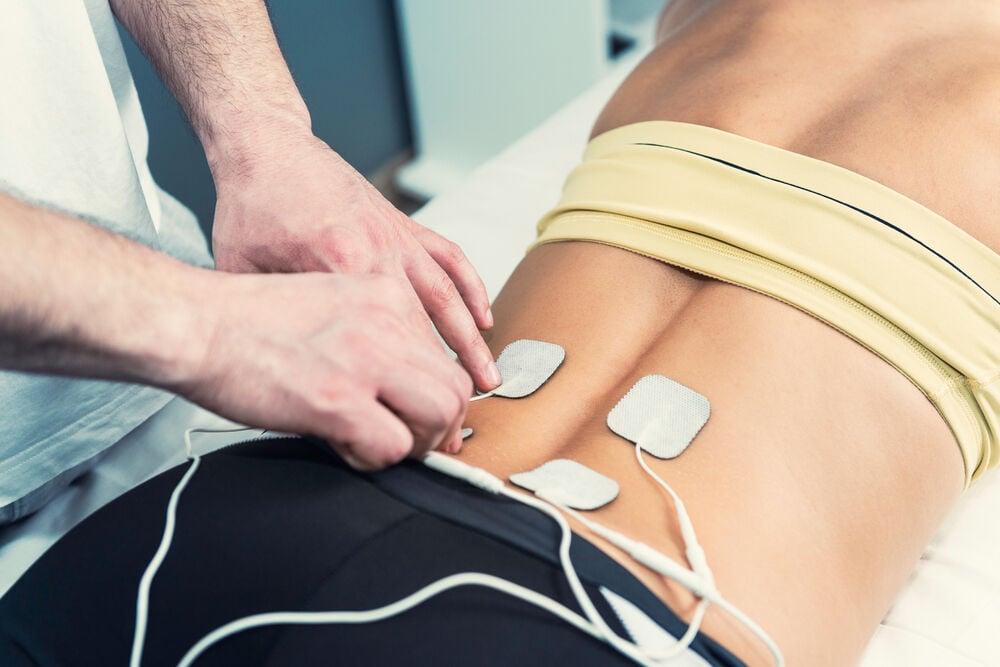Widely used to treat acute and chronic pain, TENS is short for transcutaneous electrical nerve stimulation. A small battery-powered device transmits low-voltage electrical signals via electrodes to your neural pathways. Below, find out everything you need to know about TENS therapy.
-
Tracking cycle
-
Getting pregnant
-
Pregnancy
-
Help Center
-
Flo for Partners
-
Anonymous Mode
-
Flo app reviews
-
Flo Premium New
-
Secret Chats New
-
Symptom Checker New
-
Your cycle
-
Health 360°
-
Getting pregnant
-
Pregnancy
-
Being a mom
-
LGBTQ+
-
Quizzes
-
Ovulation calculator
-
hCG calculator
-
Pregnancy test calculator
-
Menstrual cycle calculator
-
Period calculator
-
Implantation calculator
-
Pregnancy weeks to months calculator
-
Pregnancy due date calculator
-
IVF and FET due date calculator
-
Due date calculator by ultrasound
-
Medical Affairs
-
Science & Research
-
Pass It On Project New
-
Privacy Portal
-
Press Center
-
Flo Accuracy
-
Careers
-
Contact Us
TENS Unit: Uses, Benefits, and Side Effects


Every piece of content at Flo Health adheres to the highest editorial standards for language, style, and medical accuracy. To learn what we do to deliver the best health and lifestyle insights to you, check out our content review principles.
What is a TENS unit?
A TENS unit is a small, battery-operated machine designed for at-home use. It contains leads that connect to electrodes, or sticky pads, which must be attached directly to your skin. Once powered on, the TENS machine delivers mild electrical impulses to the affected region, causing a tingling sensation.
The electrical current may help in reducing the transmission of pain signals to your brain and spinal cord, alleviating discomfort and relaxing your muscles. Furthermore, it could aid in the secretion of endorphins, your body’s natural painkillers.
What can TENS units be used to treat?
Recent studies cite the intensity of TENS stimulation as a key factor in its success as a pain management tool. You should opt for the maximum tolerable setting every time to achieve better results. TENS units ease pain and reduce muscle spasms caused by various conditions, such as:
- Arthritis: TENS units address the symptoms of joint pain and stiffness associated with osteoarthritis, rheumatoid arthritis, psoriatic arthritis, etc.
- Period pain: The contraction of your uterine walls during menstruation results in mild to intense period pain that affects many women.
- Pelvic pain from endometriosis: If you’ve been diagnosed with endometriosis, you might experience both pelvic and period pain. This discomfort is brought on by the growth of endometrial tissue outside of your uterus (e.g., in the fallopian tubes or ovaries).
- Labor pain: TENS therapy has been known to relieve lower back pain during the early stages of labor.
- Knee pain: A TENS unit could help tackle knee problems attributed to injury or certain medical conditions.
- Neck pain: Typically caused by bad posture, a pinched nerve, injury, or poor sleep positions, recurring neck pain is treatable with TENS therapy.
- Back pain: Unfortunately, lower back pain is a medical issue that plagues people of all ages. Although TENS therapy is sometimes recommended as a potential remedy, its efficacy is not yet supported by extensive research.
- Sports injuries: You might sustain a sports injury due to an accident, overexercising, the use of poor technique or inappropriate equipment, or skipping proper warm-ups.
- Fibromyalgia: It’s a chronic condition characterized by widespread body pain, fatigue, sleep disturbances, and memory problems. A few researchers point to TENS therapy as an effective method of pain relief, especially in conjunction with regular exercise.
- Muscle, bone, or joint problems related to osteoporosis
- Cancer pain
- Neuropathic pain
Keep in mind that there is no conclusive body of scientific evidence on the benefits of using a TENS unit for managing pain. Doctors say TENS therapy works well for some, but results vary greatly depending on the individual and their specific condition. TENS therapy is not a permanent cure for pain and only provides short-term relief.
Who should avoid TENS therapy?
While most can use TENS units safely at home, either alone or in combination with other medical therapies, it’s not for everyone. Steer clear of TENS machines if you have:
- Any kind of metal or electrical implant like a defibrillator or pacemaker
- A spinal cord stimulator
- In-home monitors or pumps
Always consult your doctor before using a TENS unit if you have:
- A cardiovascular condition
- Epilepsy
- Cancer
- Diabetes
- Cognitive impairment
Lastly, if you are pregnant or suspect you may be pregnant, it’s best to check with your doctor before getting a TENS unit.
Benefits of using a TENS unit
Take a quiz
Find out what you can do with our Health Assistant

If you’ve been struggling with body pain, TENS therapy could be a viable treatment option. According to research studies, it’s most effective at reducing chronic or long-term pain when applied for at least half an hour while active. Results are less than optimal if applied while sitting still, resting, or lying down.
While TENS therapy has the potential to offer instant and prolonged pain relief to some; for others, it takes a bit longer to notice the difference. Also, medical experts haven’t reached a consensus on the exact health conditions that TENS therapy is suitable for treating.
Possible side effects
Note that improper use of a TENS unit could cause mild electrical burns or irritation from the electrodes. Certain allergic reactions to the sticky pads, including redness and swelling of your skin, may also occur. If this happens, consider switching to another type of pad. Finally, remember to stay away from any source of water during your therapy sessions.
For the majority of TENS machine users, however, it’s a safe, convenient form of therapy with no adverse effects.
Takeaway
A TENS unit transmits low-voltage electrical currents to deliver pain relief. TENS therapy can take place in the comfort of your own home or at a medical facility. Since results vary greatly, be sure to consult your doctor before using a TENS device.


Hey, I'm Anique
I started using Flo app to track my period and ovulation because we wanted to have a baby.


The Flo app helped me learn about my body and spot ovulation signs during our conception journey.


I vividly
remember the day
that we switched
Flo into
Pregnancy Mode — it was
such a special
moment.
Real stories, real results
Learn how the Flo app became an amazing cheerleader for us on our conception journey.




